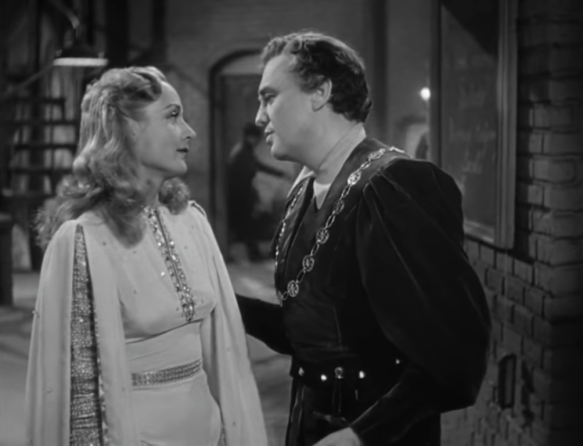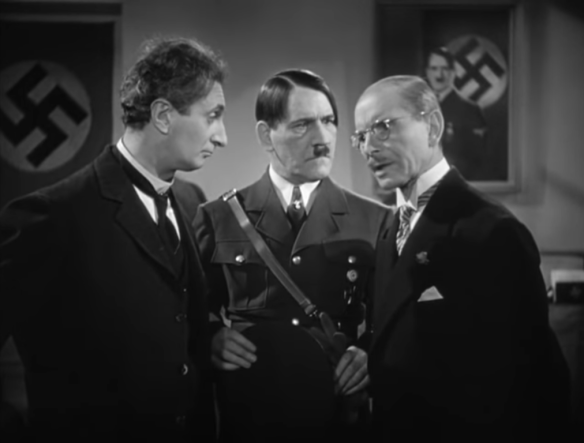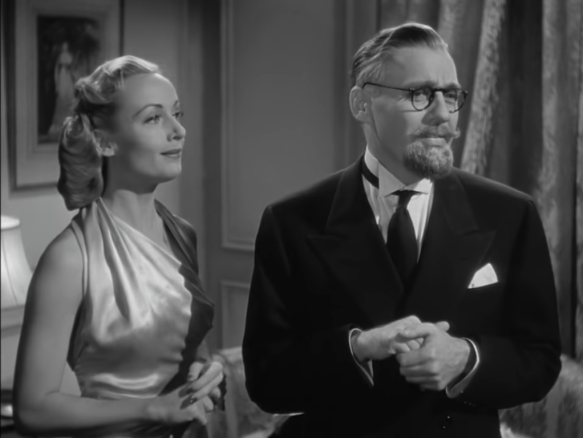
“What he did to Shakespeare, we are doing now to Poland.” – Ehrhardt about Josef Tura
Our story begins in Warsaw during peacetime. In some sense, this is a period piece because the gulf between the Nazi invasion of Poland in September 1939 and the comparably idyllic years prior could not be more starkly different. The world still maintains its innocence.
And yet, what’s this! A stir in the streets. Taxis stop. Heads turn. What are they gaping at? It’s none other than Adolf Hitler walking down Main Street! How in Hades did he get there? It catches the audience off guard, though not as much as seeing Jack Benny in a Gestapo uniform.
Of course, this sequence is all part of a performance as the stage elements fall away. The story focuses on a theater troupe trying to carry on with Europe in an uproar. From a purely theatrical perspective, this allows To Be or Not To Be license to literally lift Hamlet’s own play within a play (or in this case a movie) structure. So now with the framework set in place, there is ample space for meta qualities, breaking of the fourth wall, and with it, satirical commentary.
Joseph and Maria Tura are an acting power couple with dueling vanities headlining Hamlet. Carole Lombard, in ravishing dress, is elegance personified. Imagine, this was my first impression of her before dipping into her screwball filmography. It suits her in her final screen performance.
What an odd choice Jack Benny seems for this picture. Even today, he’s far more well-known for his radio show, violin playing, and his public persona as the hand-to-cheek comedian. He was a contemporary of Bob Hope and Bing Crosby but never managed the same share of the box office. Regardless, Lubitsch saw something in him no one else was willing to consider. He’s not exactly Laurence Olivier, but that’s precisely the point.
However, we are also reminded how theater is communal. The hammy Lionel Atwill is always pushing the envelope, both in life and reality. It takes his colleagues to rein him in. The spear holders Greenberg and Bromski, meanwhile, dream of roles that might one day actually utilize their talents. Their exacting director Dobosh (Charles Halton in one of his more animated performances) keeps the egos in check and the performances grounded in the material.
Circumstances always seem to get in the way of the best-laid plans. Maria has a handsome admirer (Robert Stack), who repeatedly visits her backstage, much to her husband’s chagrin. No, he doesn’t know about their private meetings. It’s the fact the young man gets up repeatedly during his “To Be or Not To Be” soliloquy; he doesn’t take kindly to the insult. Yes, he’s a jealous husband, but his whiny, puffed-up ego is the first thing to be affronted.

Another slap to the face comes when their new play, “Gestapo,” gets nixed because it might offend Hitler, so they keep Hamlet going instead. It signals a change. It means War! The Nazis roll into Poland, and the city takes a hit. Bressart looks on glumly, uttering a fitting observation, “There was no censor to stop them.”
The embodiment of evil — in all its grotesque idiocy is Colonel Ehrhardt (Sig Ruman) — his orders posted up all around the city. We don’t get the fine print, but we get the gist: concentration camps, the death penalty, and being shot on sight are frank enough.
But the roots of Nazism are even more insidious. They have snuck behind enemy lines. Stack is among those who band together in the Polish branch of the RAF freedom fighters. In good faith, they pass on goodwill to loved ones to a Professor Siletsky — only for his wires to get crossed. They must eradicate the mole.
This is no goofy charade and Lubitsch sells out to tell the story. In this regard, he lends his players an amount of dramatic integrity. The menace is overt throughout the picture. For instance, when Stack parachutes back into Poland and flees into the night as a patrol of German fan out to intercept him.
In her own harrowing arc, Maria Tura is taken by the Gestapo. However, there’s nothing quite so sinister about it — at least in terms of her person — they offer a proposal for her to become a spy. She has to think about it.
Her husband, Joseph, has his own conundrum in the form of a befuddling Goldilocks moment, finding a young man sleeping in his bed. He does one of his iconic double-takes followed by others in quick succession as he makes his way around the room leaning over the bed. It couldn’t possibly be his soliloquy defector, could it?
For the entire acting troupe, their greatest performances are called upon to intercept the Nazi spy with his incriminating cache of papers. They rebrand their theater as Gestapo headquarters with Tura cast as their irrepressible lead, struggling to originate such an uncharted role. He’s eventually relieved of his ad-libbing responsibilities when he can take on a more biographical role — based on, shall we say, previous experiences.
The petty feud and marital jealousies between Mr. and Mrs. Tura remain an undercurrent to all their valorous acts. One of their constant marks is the oaffish tyrant portrayed by Ruman and his bumbling underling Captain Schultz. In fact, with Rugman later playing a joking barracks guard in Stalag 17 (1953), it’s hard not to see the origins of Hogan’s Heroes own roly-poly Sergeant being conceived.
There’s an obvious issue at the core of the story. Because, despite their best efforts, there are now two Siletskys running about. It leaves a lot of explaining to do, and the Nazis are reasonably suspicious.

The final act is the finest. They make the most solemn Nazis out of the bunch the night of the show. Even if it is fiction, it still makes the hair on my arms stand on edge — all the men in Nazi uniforms streaming into the theater, standing in unison to salute.
Felix Bressart finally gets his chance to play Shylock in the most crucial turn of his career, and he brings every ounce of pathos he has into the performance. The recontextualization of the passage takes on new import pregnant with so much meaning. It is an assertion of such dignity in the face of such an egregious and ugly juggernaut as the Nazi war machine.
Truthfully, one of the hardest elements to appreciate about To Be or Not to Be is just how layered and multifaceted it remains. Being bred on Hogan’s Heroes and knowing a bit of the Lubitsch repertoire, there are some preconceived notions about what we might be exposed to. And the film certainly has wit, but we must be careful here lest the indignant get the wrong idea.
It’s quite alright to not like the film. I can only gather there are many detractors because this history is so deeply devastating. It carries so many wounds and grievances for the atrocities committed against not only Poland, but the Jews, and anyone else who was considered a target of the Nazis. The controversy is founded for these reasons. Rightfully so, I might add. Perhaps the picture is making light of this.
In my earlier days, I even believe I tried to defend this and other earlier films suggesting they could not have known the extent of the Nazis. This too seems a weak argument. And yet when I watched the film this time, I was reminded just how sincere even profound it is in-between the lines.
Yes, Benny at the center seems vain and conceited — this American comedian known for a very particular shtick — but then I look to Carole Lombard. Never has she been more majestic and extraordinary. Then the likes of Felix Bressart and Tom Dugan are forlorn while still carrying a quiet dignity about them. They get the laughs but with a straight face. They understand the gravity of what they are taking part in.
It’s too convenient to say To Be or Not To Be was ahead of its time. Certainly, there was controversy and the resolution to WWII was far from a foregone conclusion. Thus, it makes Lubitsch’s perceptiveness all the more startling. Likewise, there’s the defense he made of his work even going to the papers to do so. This is an excerpt of what he said:
“What I have satirized in this picture are the Nazis and their ridiculous ideology. I have also satirized the attitude of actors who always remain actors regardless how dangerous the situation might be, which I believe is a true observation. It can be argued if the tragedy of Poland realistically portrayed in To Be or Not to Be can be merged with satire. I believe it can be and so do the audience which I observed during a screening of To Be or Not to Be, but this is a matter of debate and everyone is entitled to his point of view.”
Ironically, here the touch of Lubitsch is not so much a comic fingerprint or sophisticated implementation of visual or even sensual comedy. What I am left with is the veracity and the bravery of his humanity. Not many men would be bold enough to make this film and then double down on what they had created.
4.5/5 Stars
